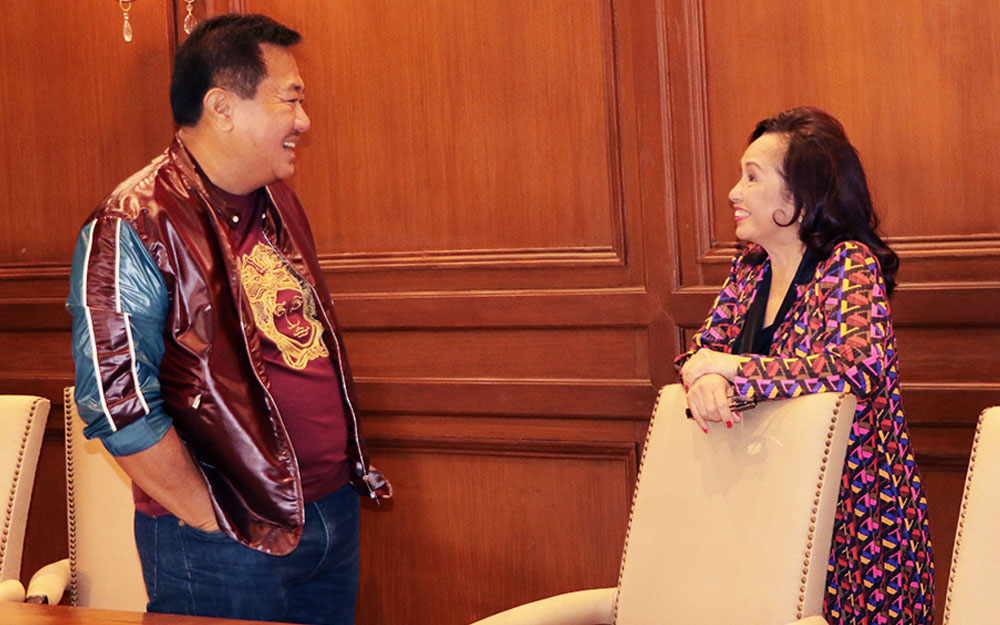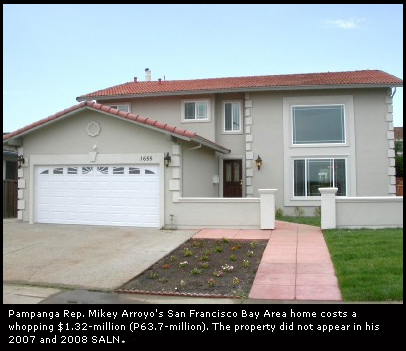The severely criticized House Resolution 2467 that gives lawmakers the final say on whether or not journalists and the public can access their Statements of Assets, Liabilities and Net Worth (SALN) is not a new proposal.
Authored by Speaker Gloria Macapagal-Arroyo, HR 2467 is essentially the same as House Resolution 1410 introduced in 2017 by then speaker Pantaleon Alvarez. The Alvarez proposal was not acted upon, while the Arroyo measure was filed and approved on the same day. Arroyo replaced Alvarez in 2018.
Both measures had the same restrictive rules on accessing SALNs, which impede transparency in government.
Here are three facts you need to know about the SALN, a powerful tool in uncovering unexplained wealth.
What is a SALN and why is it important?
The SALN is a declaration of a government employee’s assets: real property, cash on hand or in banks, stocks and bonds, personal property like cars; liabilities: loans and debts; and business interests and financial connections. This includes the interests and connections of his or her spouse and children who are unmarried or minors.
A constitutional requirement, all public officers and employees need to file under oath their respective SALNs. Republic Act 6713 or the Code of Conduct and Ethical Standards for Public Officials and Employees require its submission within 30 days after assuming office, on or before April 30, annually and within 30 days after separation from service.
A government employee who fails to file his or her SALN may be fined, suspended, removed, and in some cases, imprisoned and disqualified to hold public office.
A powerful accountability tool, the SALN has been instrumental in the ouster of two chief justices: Maria Lourdes Sereno, who failed to file her SALN 17 times as a university professor prior to being Chief Justice; and Renato Corona, who failed to declare $2.4 million in bank deposits and P80 million in three peso accounts.
Journalists also used it to expose former President Joseph Estrada’s hidden wealth, which formed the bases of impeachment complaints against him.
The SALN was instrumental in the filing of tax evasion cases amounting to P 27.3 million against Arroyo’s eldest son, former Pampanga Representative Juan Miguel “Mikey” Arroyo in 2011. He was acquitted by the Supreme Court in December 2018. Arroyo herself was indicted, detained for five years but eventually released after the Supreme Court dismissed plunder charges against her in 2016.
What is the HR 2467 all about?
Under HR 2467, request for a House member’s SALN need plenary approval—currently, a majority of 291 lawmakers to vote in favor of releasing the SALN of a colleague or a House. A copy of a SALN costs P300 each.
The Arroyo resolution is almost a carbon copy of the Alvarez proposal. The only difference between the two resolutions is in the composition and selection of committee members. In Alvarez’s proposal, members of the review committee shall be chosen by the speaker, upon the recommendation of the Committee on Rules. In Arroyo’s version, only the speaker gets to pick committee members.
In 2012, former Speaker Feliciano Belmonte issued Special Order 05-12 that created a similar committee to formulate rules on public access to SALNs in the aftermath of Chief Justice Renato Corona’s impeachment trial.
According to lawyer Christian Monsod, one of the framers of the 1987 Constitution, House members have long resorted to “a very creative circumvention of the law. ”
The House released only summaries of SALNs and not the SALN itself, Monsod said in a 2012 interview with ANC during the Corona trial.
This practice has continued. Currently, the House releases summary reports of lawmakers’ SALNs annually, that show only the amounts of a lawmaker’s assets, liabilities and net worth, but not actual properties. HR 2647 maintains this policy.
Because of a lack of a standard process to access SALNs, government institutions prescribe different steps. A person can request the SALN of a public official from the House, Senate, Malacañang, Office of the Ombudsman, the Civil Service Commission and the Supreme Court.
In the aftermath of the Corona impeachment in 2012, the high court ordered the disclosure of the SALN and the credentials of all members of the judiciary, overturning a decades-old rule that prohibited the release of these documents due to an incident that exposed them to harassment.
But requests for copies of SALNs of justices of the SC, the Court of Appeals, Sandiganbayan and the Court of Tax Appeals, the authority to disclose shall still be made by the court en banc.
What does this mean for freedom of information?
HR 2467 has been lambasted as a step backward for the Duterte administration’s freedom of information initiative, which was certified as priority in the president’s legislative agenda.
In 2016, President Rodrigo Duterte signed Executive Order No. 2, which strengthens freedom of information in the executive branch. A year later, Malacanang redacted information such as family members and home addresses in the SALNs of Cabinet members, saying government officials “still have the right to privacy.”
In Congress, FOI bills have been languishing for years. A consolidated version of 33 FOI bills, which would have required high-ranking government officials to post SALNs on their websites, remains pending in the Committee on Appropriations since 2017. This pending bill is incompatible with HR 2467.
Monsod, who was chairperson of the Committee of Accountability of Public Officers during the Constitutional Commission of 1986, said the SALN should be “open books.”
“The mere filing (of SALN) does not constitute disclosure. There must be a process where it must be accessible,” Monsod said. “There must be a public disclosure, meaning, not that you put it all in the newspaper, but it should be easy for people to get a copy of the SALN. It should be easy, and it is difficult.”
Sources:
ABS-CBN News, Belmonte forms SALN committee, June 19, 2012
ABS-CBN News, Corona’s cash: US$2.4M plus P80M, May 25, 2012
ABS-CBN News, Supreme Court upholds Mikey Arroyo’s tax evasion acquittal, Dec. 5, 2018
ABS-CBN News, TIMELINE: The Arroyo plunder case, July 19, 2016
Archive.org, Record of the Constitutional Commission: Proceedings and Debates Vol. II
BBC, Philippines’ Gloria Arroyo plunder charges dismissed, July 19, 2016
BusinessWorld, Corona convicted for failing to disclose assets, May 30, 2012
GMA News Online, Corona convicted, May 29, 2012
GMA News Online, Court clears Mikey Arroyo in P27.3-M tax evasion case, March 28, 2018
House of Representatives, SALNs of House members are not secret, Jan. 11, 2012
House of Representatives, House oks FOI bill, Feb. 16, 2017
House of Representatives, House panel OKs impeachment vs. Sereno, March 19, 2018
House of Representatives, House Resolution No. 2467
House of Representatives, House Resolution No. 1410
Inquirer.net, Arroyo walks free after 4 yrs of hospital detention, July 21, 2016
Inquirer.net, House forms committee for SALN disclosure, June 7, 2012
Office of the Ombudsman, Republic Act No. 6713
Office of the Ombudsman, Republic Act No. 3019
Official Gazette, Executive Order No. 2, s. 2016
Official Gazette, Statements of Assets, Liabilities and Net Worth (SALN)
Official Gazette, The 1987 Constitution
PCIJ, Can Estrada explain his wealth?, July 24, 2000
Philstar.com, SC upholds dismissal of tax evasion rap vs Mikey Arroyo, Dec. 5, 2018
Presidential Communications Operations Office, Palace welcomes UN’s final and unanimous adoption of PH human rights report, Sept. 23, 2017
(Guided by the code of principles of the International Fact-Checking Network at Poynter, VERA Files tracks the false claims, flip-flops, misleading statements of public officials and figures, and debunks them with factual evidence. Find out more about this initiative and our methodology.)



